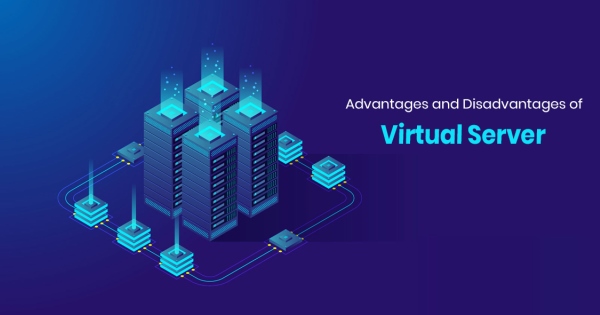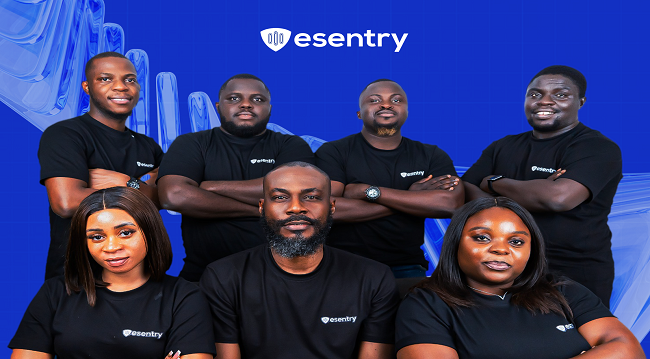E-Business
Navigating the Virtual Server Vendor Selection Process

Servers are an important part of computing architecture. It’s what holds your files, applications, and websites. When a request is made over a network, it goes to the server, which accepts and responds to that request. In simple terms, servers make the networks deliver the results they exist to provide.

Traditionally, servers are “bare metal” hardware located on-premise or found in off-site data centers. But more recently, a second option—the virtual server—has become sought after and available from IT service vendors.
What Is a Virtual Server?
A virtual server is a server that’s housed on an offsite data center (away from the user business’s premise) and is split into multiple virtualized instances. Each of these multiple virtualized compartments functions just like a hardware server would.
A result of this is that hardware servers can attain full utilization—something that wasn’t often achieved for traditional servers on their own.
Why Virtual Servers Are an Attractive Option
The main difference between hardware and virtual server is that the former runs only a single operating system, while the latter (the virtual server) can run multiple operating systems. As such, virtual servers can save businesses a lot of space, and help them avoid the cost of acquiring extra physical servers.
Although the advantages of having a virtual server are clear, the quality of service around any virtualized server may differ across vendors. Businesses looking to enjoy the scalability and cost-savings of the virtualized server will do well to examine and compare providers offering this product before signing on with them.
There are a number of things that businesses can look for in a prospective virtual server provider. They are discussed below.
Uptime and Performance
The server uptime refers to the total duration for which a server is functional. Downtimes are the period in which the server is offline or not functional.
Organizations looking to sign up with a server virtualization vendor should go for one that provides the highest possible uptimes (i.e. lowest possible downtimes). This is important because it determines the performance of the applications and websites you will host on a server.
Higher uptimes will make your files, websites, and applications available more often. If the duration of your downtimes is too long, it could impact your business’s IT performance, and may ultimately affect bottom lines negatively.
The closer your uptime is to 100%, the better. Go for providers who deliver at least 99.9% uptime.
The quality of the server will also determine other performance metrics like network response speeds and load times. If it’s subpar, these things will also be affected. Ascertain that your prospective provider doesn’t have any of these issues.
Maintenance and Customer Support
With virtual servers located off-premise, you will have to depend a lot more on your vendor to help out with maintenance and support. This is crucial if you need to troubleshoot something urgently, and don’t want your server issues to negatively impact your business.
When weighing up server providers, find out how many hours they are available. Do they promise round-the-clock support? Also find out whether they can attend to you via the channels you prefer, whether it is email, live chat, or phone.
If it’s possible, also look for reviews concerning the quality of support they give. It’s one thing for service providers to promise a steady response and quite another for them to tackle your issues satisfactorily. By learning from their previous or existing clients, you can have a good feel of the sort of service you can expect from them.
Managed Versus Unmanaged Service
With your virtual server, you can either choose a managed or unmanaged service plan.
If you go for managed service, you outsource management and maintenance of your virtual server to the service provider. But if you settle for unmanaged service, you have greater control over your server. Both these options come with advantages and challenges.
Managed service ensures that experts at your vendor’s end will take care of your server issues, including maintenance and optimization.
This takes the burden of the technical details off you and allows you to focus on your core business concerns. However, you don’t have as much direct control of the servers as you would get with an unmanaged plan.
Unmanaged plans, on the other hand, let you customize your server as you wish. However, you will have to monitor, manage, and maintain it, all of which require time and, potentially, extra costs. It’s also not an advisable option for businesses that do not have the technical know-how required to take care of virtual servers.
Pricing And Budgetary Considerations
Virtual server costs vary across service providers. Organizations will want to go with a vendor that offers them the best possible product at a decent cost—where ‘decent’ is defined as fit with their budget.
Navigating this aspect of the acquisition process can be tricky, especially because it involves balancing budgetary constraints and quality. Nevertheless, the scalability that comes with virtual servers takes care of some of these concerns.
It is also worth finding out what the components of the total costs are. This may give you an insight into whether the stated prices are worth bearing.
Things like hard drive space, CPU cores, and RAM are part of the package and may cause the wide differences observed between price quotes across various providers. Knowing how these things contribute to the final price could help you choose a vendor with a decent offer.
Final Words: Go for a Vendor You Can Trust
Businesses dependent on IT need virtual servers that are efficient and effective. But they also want these servers from competent providers who offer good prices and great customer support. Without these, their operations may suffer.
Layer3Cloud takes care of these concerns with its best-in-class virtual server offerings. Our services leverage the expertise of our engineers and consultants, our deep knowledge of organizational needs, and our years of experience in the Nigerian terrain. Clients from diverse industries trust us to give them IT solutions that are tailored for them.
If you would like to learn about our virtual servers, cloud products, and other services, you can do that here.
E-Business
esentry 2025 Report Shows Healthcare, Financial Services and Telecoms as Staging Grounds for Increased Cyberattacks in Africa

Cyber adversaries targeting African organisations are increasingly shifting away from opportunistic attacks toward deliberate, sector-specific campaigns aimed at the continent’s most critical digital infrastructures, according to the esentry 2025 Annual Report released by esentry, Lagos-based Africa’s leading indigenous Managed Security Service Provider (MSSP).

The report identifies healthcare, financial services, and telecommunications as the primary staging grounds for high-velocity cyberattacks, reflecting a growing focus on sectors that underpin economic stability, public welfare, and digital connectivity across Africa.
The findings are drawn from one of the largest cybersecurity datasets analysed in the region. Over the course of 2025, esentry processed more than 31 billion security events, generating 3.5 million alerts and successfully blocking over 15,000 malicious attempts. This monitoring scale shows that, while traditional financial institutions remain a core target, the threat landscape has expanded to include digital lending platforms, healthcare systems that store sensitive personal data, and telecom operators responsible for national and regional connectivity.
Within the healthcare sector, the report highlights ransomware as the most acute risk, with attackers frequently exploiting exposed Remote Desktop Protocol (RDP) services to compromise patient data and disrupt essential medical operations. In financial services, organisations are facing a surge in credential abuse, insider-related threats, and info-stealer malware designed to enable fraud and unauthorised access. Telecommunications providers are increasingly targeted by highly tailored phishing campaigns and attacks on exposed web services, which aim to harvest credentials and compromise customer data.
Commenting on the findings, Gbolabo Awelewa, Chief Business Officer at esentry, said the nature of cyber threats across Africa has evolved significantly. “The threats we are seeing today are deliberate, informed, and carefully tailored to local enterprises. Attackers are exploiting trusted access and moving quietly within networks, which makes early detection critical. Our coordinated cybersecurity model, spanning Defence, Intelligence, Offence, and Security Engineering, allows us to combine scale, speed, and deep contextual insight to detect and neutralise threats before they escalate,” Awelewa said.
A defining trend identified in the report is the shift from overt system exploitation to the abuse of legitimate access. By leveraging compromised credentials and ‘living-off-the-land’ techniques, attackers can blend into routine enterprise operations and significantly delay detection. This approach has compressed the attack lifecycle, enabling adversaries to move from initial access to full operational impact in fewer than 15 days.
To counter this acceleration, the report emphasises the importance of early detection and automated response. esentry says it currently contains low-complexity incidents in under 90 seconds, using a combination of structured threat hunting and centralised telemetry to anticipate and absorb attacker pressure rather than reacting after damage has occurred.
As African organisations continue to digitise, the esentry 2025 Annual Report positions itself as a critical reference point for understanding the continent’s evolving cyber threat environment. The report concludes that protecting Africa’s digital trust will require a shift away from fragmented security tools toward disciplined, coordinated defence frameworks, what esentry describes as a unified Phalanx formation.
E-Business
AfDB, UNDP Launch $10Bn AI Initiative for Africa

The African Development Bank Group (AfDB) and the United Nations Development Programme (UNDP) have launched an ambitious $10 billion project to support the adoption of Artificial Intelligence (AI) across the continent.

The 10 Billion Initiative intends to accelerate ethical AI adoption and inclusive digital economic growth in Africa.
The initiative follows the Nairobi AI Forum, which took place earlier this month in Kenya and brought together governments, private sector leaders, development partners, and tech innovators to define pathways for impactful AI adoption.
According to the organisations, the strategy is a co-designed collaboration between the Bank Group, UNDP, and commercial partners that aims to raise up to $10 billion by 2035.
The resources will be used to create up to 40 million new jobs across the continent by 2035, through targeted investments that provide the groundwork for AI and accelerate widespread adoption in everything from entrepreneurship and regional data infrastructure to policy frameworks and skill development.
Nicholas Williams, AfDB Group ICT operations division manager, commented: “As a leading multilateral development institution, the bank is leveraging its comparative advantage to ensure Africa is not left behind in the AI era.
“The AI 10 Billion Initiative paves the way for expanded partnerships and sustained investments that will accelerate AI entrepreneurship, strengthen data and infrastructure ecosystems, and support inclusive growth across the continent.”
E-Business
Firm Identifies RenEngine Loader Distributed Through Pirated Games and Software

Kaspersky Threat Research has revealed its analysis of RenEngine, a malware loader that has recently gained public attention. Kaspersky identified RenEngine samples as early as March 2025, with its solutions already protecting users from the threat at that time.

Beyond the cracked games highlighted in recent reports, Kaspersky researchers discovered that attackers created dozens of websites distributing RenEngine through pirated software, including graphics editors like CorelDRAW. This expands the known attack surface beyond the gaming community to anyone seeking unlicensed software.
Kaspersky has recorded incidents in Russia, Brazil, Turkey, Spain and Germany, among other countries. The distribution pattern indicates opportunistic attacks rather than targeted operations.
When Kaspersky first identified RenEngine, the loader was delivering the Lumma stealer. Current attacks distribute ACR Stealer as the final payload, and Vidar stealer has also been observed in some infection chains.
The campaign exploits modified versions of games built on the Ren’Py visual novel engine. When users launch infected installers, a fake loading screen appears while malicious scripts execute in the background. The scripts include sandbox detection capabilities and decrypt a payload that initiates a multi-stage infection chain using HijackLoader, a modular malware delivery tool.
“This threat extends beyond pirated games — attackers are using the same technique to distribute malware through cracked productivity software, which broadens the potential victim pool significantly,” said Pavel Sinenko, lead malware analyst at Kaspersky Threat Research. “Game archive formats vary by engine and title. If an engine doesn’t check the integrity of its resources, attackers can embed malware that executes the moment you click play.”
Kaspersky solutions detect RenEngine as Trojan.Python.Agent.nb and HEUR:Trojan.Python.Agent.gen. HijackLoader is detected as Trojan.Win32.Penguish and Trojan.Win32.DllHijacker.

 E-Business1 day ago
E-Business1 day agoAfDB, UNDP Launch $10Bn AI Initiative for Africa

 News2 days ago
News2 days agoNITDA Urges Stronger State Partnerships as Key to Digital Economy Goals @ South-South Stakeholders Forum

 Telecom2 days ago
Telecom2 days agoGSMA Launches Innovation Fund to Accelerate Green Transition Through Mobile Technology

 E-Business2 days ago
E-Business2 days agoFirm Identifies RenEngine Loader Distributed Through Pirated Games and Software

 Telecom2 days ago
Telecom2 days agoProf. Adeyanju is Strengthening Nigeria’s Digital Backbone for a Connected Future in Two Years of Purposeful Leadership

 E-Financial2 days ago
E-Financial2 days agoFidelity Bank Launches HerFidelity Apprenticeship Programme 2.0 to Boost Women Entrepreneurship

 Telecom1 day ago
Telecom1 day agoGrey Expands Cross-Border Banking with USD Accounts, USDC Support

 E-Financial2 days ago
E-Financial2 days agoTAJBank Secures A1 Ratings from Agusto, Datapro















